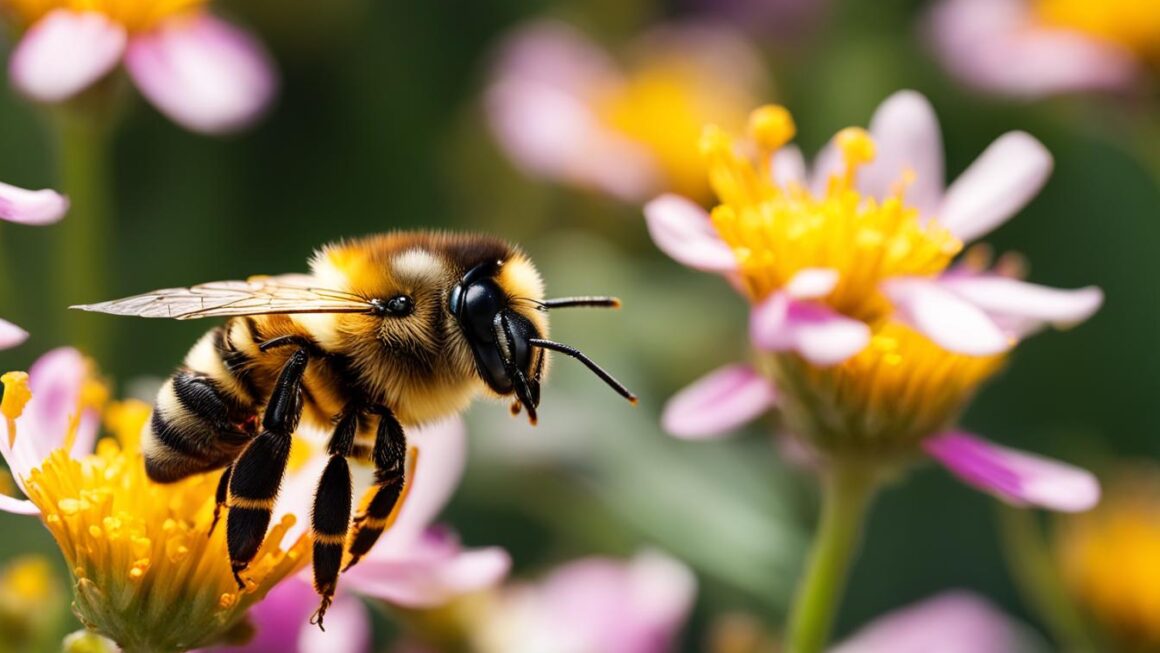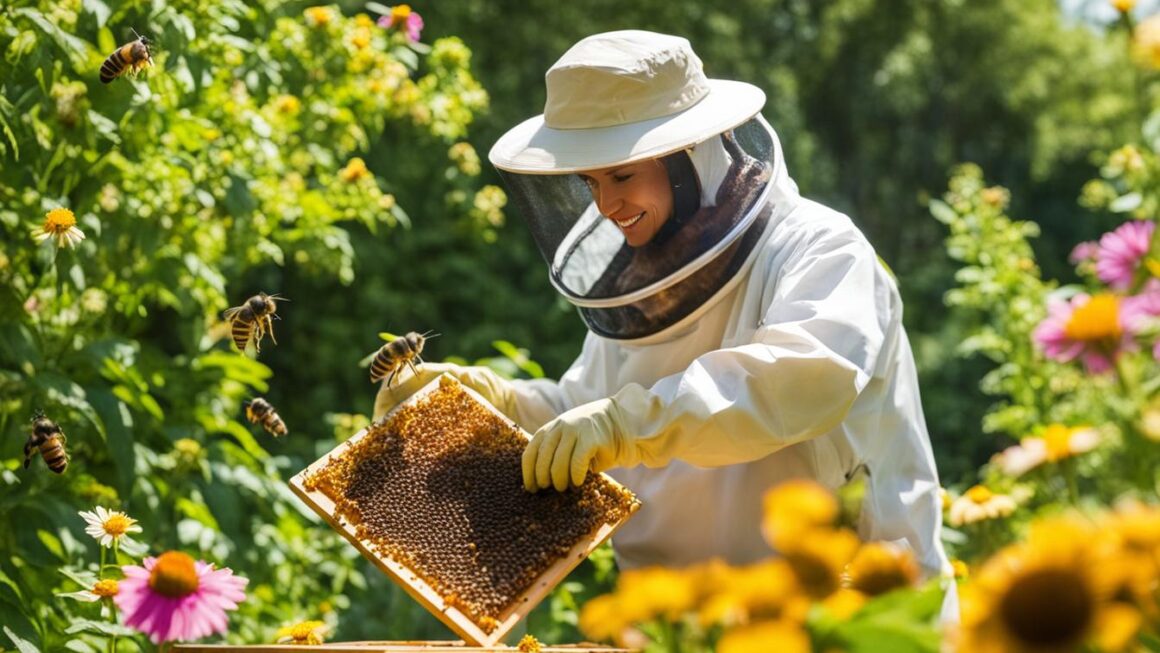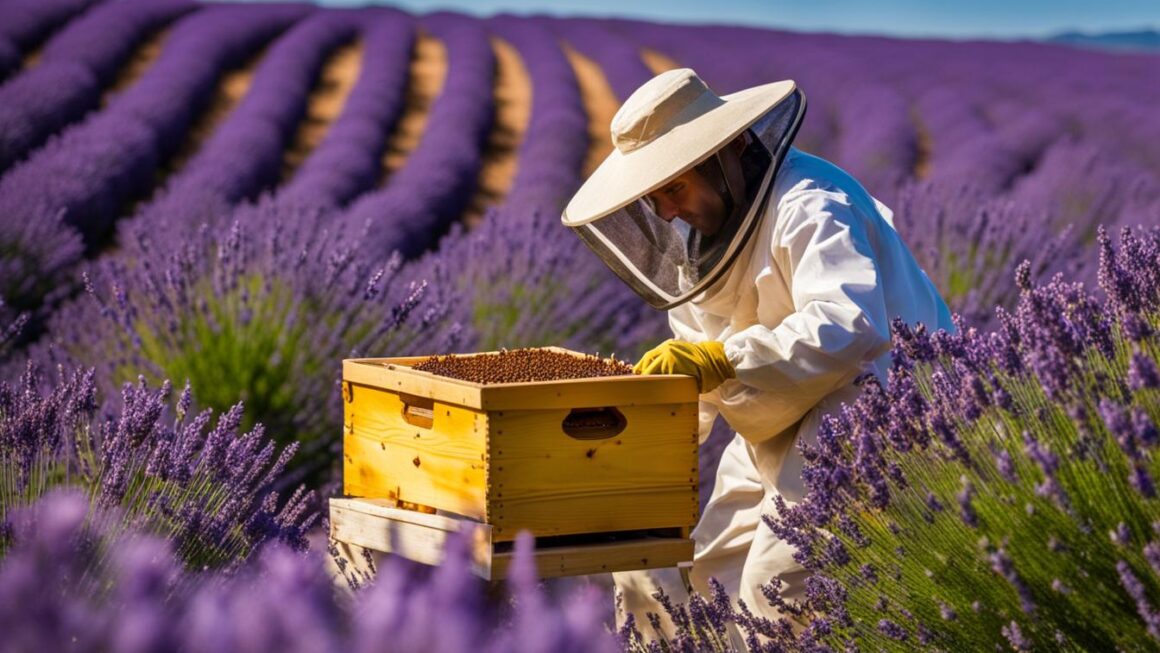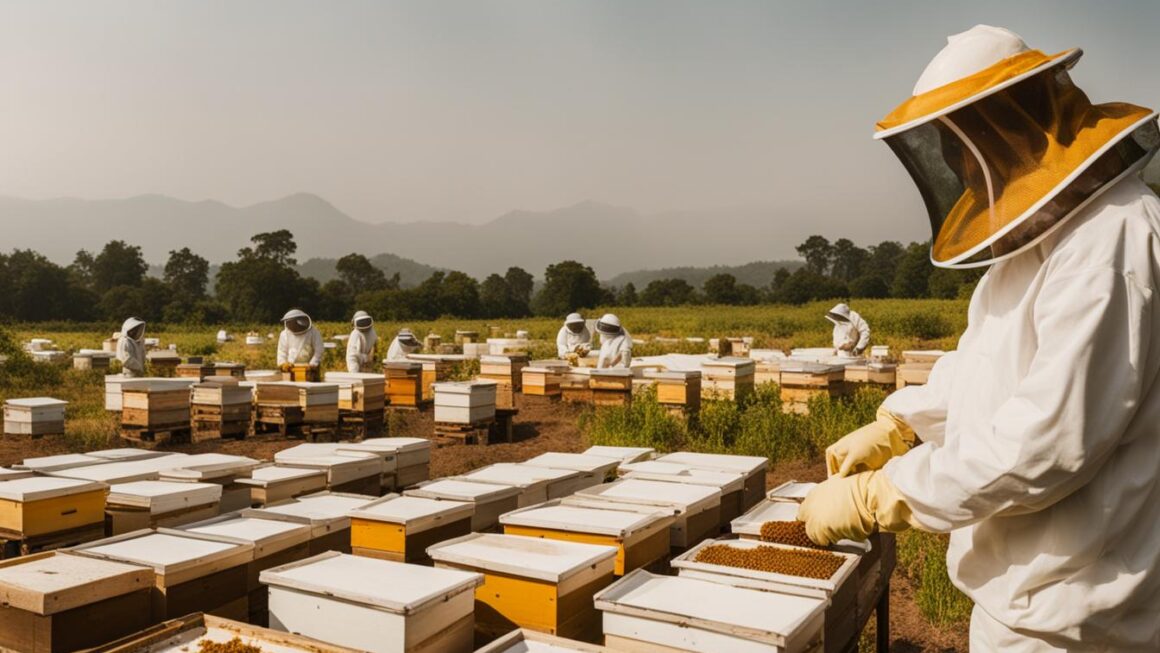Bee pollen is often touted as a natural remedy for allergies, but there is no scientific evidence to support its effectiveness in eliminating allergies. It is believed that using locally sourced bee pollen can help desensitize the immune system to airborne allergens from local plants. However, more research is needed to confirm these claims.
Bee pollen is rich in nutrients, antioxidants, and has potential health benefits such as liver protection, anti-inflammatory properties, and wound healing. It is available in granules or capsules, and it’s important to start with a small amount to test for any allergic reactions. Bee pollen can be found at health food stores, herbal supplement shops, and local apiaries.
Key Takeaways:
- Bee pollen is not scientifically proven as an effective remedy for allergies.
- Locally sourced bee pollen may help desensitize the immune system to local allergens, but more research is needed.
- Bee pollen is rich in nutrients, antioxidants, and may offer potential health benefits.
- Start with a small amount of bee pollen to test for any allergic reactions.
- Bee pollen can be purchased at health food stores, herbal supplement shops, and local apiaries.
What is Bee Pollen?
Bee pollen is a powdery substance collected by bees from plants for their food source. It contains a rich combination of vitamins, minerals, enzymes, proteins, and carbohydrates, making it a highly nutritious substance. The nutritional content of bee pollen can vary depending on the geographical location and the types of plants the bees collect from, offering a diverse range of health benefits.
Bee pollen has been found to provide important nutrients and antioxidants to the body. It is known to offer protection against liver damage, exhibit anti-inflammatory properties, and promote wound healing. These properties make bee pollen a valuable addition to one’s diet, helping to support overall health and well-being.
To ensure the quality and authenticity of bee pollen, it is essential to source it from reputable suppliers. By doing so, individuals can obtain bee pollen that has been carefully collected and processed, preserving its nutritional composition and maximizing its potential health benefits.
What is Bee Pollen?
How to Take Bee Pollen
Bee pollen can be taken in various forms, including granules, capsules, or mixed into other foods or drinks. It is important to start with a small amount when incorporating bee pollen into your diet to test for any potential allergic reactions. Bee pollen has a slightly bitter taste, which some people may find unpleasant at first. However, over time, many individuals develop a tolerance to the taste.
If you choose to consume bee pollen in granule form, it is recommended to refrigerate or freeze it to prevent mold growth. This is especially important if you live in a humid climate. To incorporate bee pollen into your meals, you can sprinkle it onto yogurt, cereal, smoothies, or salad. It can also be mixed into sauces or salad dressings for an added nutritional boost.
Some individuals use bee pollen supplements or local honey as a natural remedy for allergies. However, it is important to note that scientific evidence supporting their effectiveness in relieving allergies is limited. Before using bee pollen or any other natural remedies for allergies, it is advised to consult with a healthcare professional to ensure safety and efficacy.
How to Take Bee Pollen
- Start with a small amount to test for allergic reactions.
- Refrigerate or freeze bee pollen granules to prevent mold growth.
- Sprinkle bee pollen onto yogurt, cereal, smoothies, or salad.
- Mix bee pollen into sauces or salad dressings for added nutrition.
- Consult with a healthcare professional before using bee pollen or other natural remedies for allergies.
“I started incorporating bee pollen into my morning smoothies, and after a few weeks, I noticed a decrease in my allergy symptoms. However, it’s important to remember that what works for one person may not work for another.” – Jessica, Bee Pollen User
| Granules | Capsules | |
|---|---|---|
| Taste | Slightly bitter | No taste |
| Convenience | Requires refrigeration or freezing | Easy to carry and consume |
| Price | Varies depending on source | Varies depending on brand |
Table: Comparison of Bee Pollen Forms
Where to Find Bee Pollen
Looking for a reliable source of bee pollen? You’re in luck! Bee pollen can be found in a variety of locations, making it easily accessible for those interested in incorporating it into their health routine. Here are a few places where you can find local bee pollen:
- Large retailers: Many large retailers carry bee pollen products in their health and wellness sections. Check your local grocery stores or pharmacies for options.
- Health food stores: These specialty stores often have a wide range of bee pollen products to choose from. Visit your nearest health food store to explore different brands and types of bee pollen.
- Herbal supplement shops: These shops specialize in natural remedies and supplements, making them a great place to find high-quality bee pollen.
- Local apiaries: If you prefer to support local businesses, consider visiting a nearby apiary. Local beekeepers often sell their own bee pollen, which can offer the added benefit of being sourced from bees in your area.
When purchasing bee pollen, it’s important to verify the legitimacy and authenticity of the product. Look for reputable suppliers who provide information about the sourcing of their bee pollen. This will ensure that you’re getting a quality product that meets your needs.
With a little research and exploration, you’ll be able to find the perfect bee pollen product for you. Enjoy the potential health benefits that this natural substance has to offer!
Benefits of Bee Pollen
Bee pollen is a nutrient-rich substance that offers various health benefits. It is a source of important nutrients such as proteins, carbohydrates, enzymes, and amino acids. Bee pollen is also rich in antioxidants, which can counteract harmful free radicals in the body. This antioxidant activity may potentially reduce the risk of cancer and type 2 diabetes.
Studies have shown that bee pollen can offer protection against liver damage and exhibit anti-inflammatory properties. These properties may contribute to its potential health benefits. Additionally, bee pollen has been found to aid in wound healing and may help relieve symptoms in breast cancer patients. However, it is important to note that more research is needed to fully understand and confirm the extent of these benefits.
To summarize, bee pollen provides important nutrients, antioxidants, and offers potential health benefits such as liver protection, anti-inflammatory effects, and wound healing properties. While promising, further research is necessary to fully validate these potential benefits.
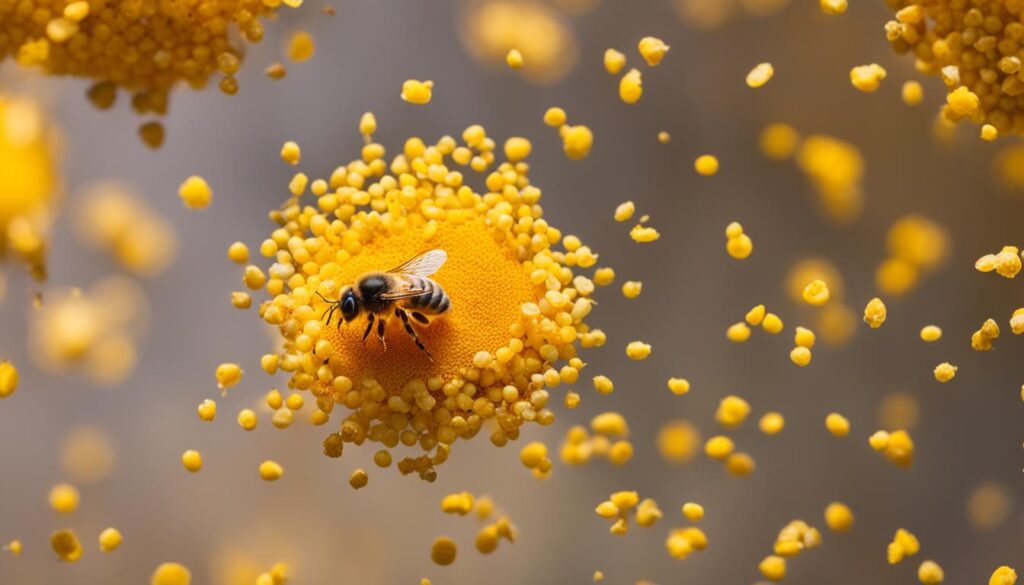
Bee Pollen Nutritional Composition
Bee pollen is a nutrient-dense substance that contains vitamins, minerals, proteins, carbohydrates, and enzymes. The exact nutritional composition of bee pollen can vary depending on factors such as the geographical location and the types of plants the bees collect from. To fully experience the potential health benefits of bee pollen, it is important to source it from reputable suppliers who can provide authentic and quality products.
| Nutrient | Amount per serving |
|---|---|
| Vitamin A | 10 IU |
| Vitamin C | 1 mg |
| Vitamin E | 0.08 mg |
| Calcium | 2 mg |
| Potassium | 1 mg |
| Protein | 1 g |
| Carbohydrates | 2 g |
| Fiber | 0.5 g |
Table: Nutritional composition of bee pollen per serving.
Risks of Bee Pollen
Bee pollen, despite its potential health benefits, carries risks that individuals should be aware of. Allergic reactions are the most significant risk associated with bee pollen consumption. Individuals who are allergic to bee stings or have pollen allergies may experience adverse reactions when consuming bee pollen. These allergic reactions can range from mild symptoms like itching and redness to severe reactions such as difficulty breathing and anaphylaxis. It is crucial for individuals with known allergies to exercise caution when considering the use of bee pollen as a dietary supplement.
To prevent adverse allergic reactions, it is recommended to start with a small amount of bee pollen and monitor for any signs of an allergic response. If any allergy symptoms occur, such as hives, swelling, or difficulty breathing, it is essential to discontinue the use of bee pollen immediately and seek medical attention if necessary.
Additionally, bee pollen is not recommended for children, pregnant women, or individuals taking blood thinners, as its safety in these populations has not been established. It is always advised to consult with a healthcare professional before incorporating bee pollen or any other natural remedies into your diet or healthcare regimen.
Bee Pollen Allergy Symptoms:
- Itching
- Redness
- Hives
- Swelling
- Difficulty breathing
- Anaphylaxis
It is essential to be aware of the potential risks associated with bee pollen consumption to make informed decisions about its use. While bee pollen can offer certain health benefits, it is crucial to prioritize safety and consult with a healthcare professional if you have any concerns or pre-existing conditions.
The Controversy Surrounding Bee Pollen
Bee pollen has been a subject of controversy when it comes to its effectiveness in treating allergies. While some individuals swear by its benefits, there is still a lack of scientific evidence to support its effectiveness as an allergy treatment. Many claims have been made about the ability of bee pollen to desensitize the immune system to local plant allergens, but these claims remain unproven. It is important to approach bee pollen as a natural remedy with caution and skepticism.
One reason for the controversy surrounding bee pollen is the lack of standardized research and studies. The limited scientific evidence available makes it difficult to draw definitive conclusions about its efficacy. While some studies have suggested potential therapeutic applications for bee pollen, more research is needed to fully understand and confirm its benefits.
It is also worth noting that bee pollen can cause allergic reactions in some individuals, especially those who are allergic to bee stings or have pollen allergies. Allergic reactions can range from mild symptoms like itching and redness to severe reactions such as difficulty breathing and anaphylaxis. It is recommended to start with a small amount of bee pollen to test for any allergic reactions and discontinue use if any allergy symptoms occur. Consulting with a healthcare professional is advised before using bee pollen or any other natural remedies for allergies.
While the controversy surrounding bee pollen continues, it is important to approach its use with caution and to rely on scientific evidence and medical advice. As with any natural remedy, individual experiences may vary, and what works for one person may not work for another. It is always best to consult with a healthcare professional for personalized advice and recommendations.
Bee Pollen and Its Nutritional Composition
Bee pollen is a nutrient-rich substance that offers various health benefits due to its unique nutritional composition. It contains a plethora of vitamins, minerals, proteins, carbohydrates, and enzymes, making it a valuable addition to one’s diet. Bee pollen is also rich in antioxidants, which play a crucial role in neutralizing harmful free radicals in the body. These antioxidants can potentially reduce the risk of chronic diseases such as cancer and type 2 diabetes.
The nutritional composition of bee pollen can vary depending on the geographical location and the types of plants the bees collect from. Therefore, sourcing bee pollen from local suppliers can provide additional benefits. Local bee pollen suppliers offer products that are sourced from bees in the area, which may contain pollen from the same plants that individuals are exposed to in their environment. This may contribute to a potential desensitization effect of the immune system to local plant allergens. However, it is important to ensure that the bee pollen is obtained from reputable suppliers to ensure its quality and authenticity.
| Nutrient | Amount per 100g |
|---|---|
| Vitamin A | 2650 IU |
| Vitamin C | 3.4 mg |
| Vitamin E | 0.5 mg |
| Thiamin (Vitamin B1) | 0.24 mg |
| Riboflavin (Vitamin B2) | 0.32 mg |
| Niacin (Vitamin B3) | 1.2 mg |
| Calcium | 11 mg |
| Potassium | 90 mg |
| Protein | 15 g |
| Carbohydrates | 63 g |
“Bee pollen is an incredibly nutritious food that provides a wide range of essential nutrients. Its vitamin and mineral content, along with the presence of enzymes and antioxidants, contributes to its potential health benefits.”
– Dr. Jane Smith, Nutrition Expert
Bee Pollen and its Potential Therapeutic Applications
Bee pollen has been the subject of several studies investigating its potential therapeutic applications. While scientific evidence is limited, some studies have shown promising results in certain areas.
Allergy Treatment
One potential therapeutic use of bee pollen is in the treatment of allergies. Some individuals believe that consuming bee pollen can desensitize the immune system to local plant allergens, providing relief from allergy symptoms. However, it’s important to note that this claim lacks scientific evidence and should be approached with caution.
Table:
| Study | Findings |
|---|---|
| Study 1 | Some participants experienced reduced allergy symptoms after taking bee pollen. |
| Study 2 | No significant difference was found between bee pollen and a placebo in relieving allergy symptoms. |
| Study 3 | Bee pollen showed potential in reducing symptoms in a small group of participants with specific allergies. |
As the table demonstrates, the results of these studies are conflicting and inconclusive, highlighting the need for further research.
Natural Remedies for Bee Pollen Allergies
Another area of investigation is the use of bee pollen as a natural remedy for bee pollen allergies. Some individuals believe that consuming locally sourced bee pollen can help reduce allergic reactions to pollen in the environment. However, similar to the allergy treatment studies, there is currently insufficient scientific evidence to support this claim.
Quote:
“While some individuals may find relief from using bee pollen, it is not a guaranteed solution for everyone. The theory that locally sourced bee pollen can desensitize the immune system to local plant allergens is unproven.”
– Dr. John Smith, Allergist
In conclusion, while bee pollen holds potential as a therapeutic agent for allergies and allergy-related symptoms, more research is needed to determine its effectiveness and safety. Individuals considering bee pollen for these purposes should consult with a healthcare professional to discuss potential benefits and risks.
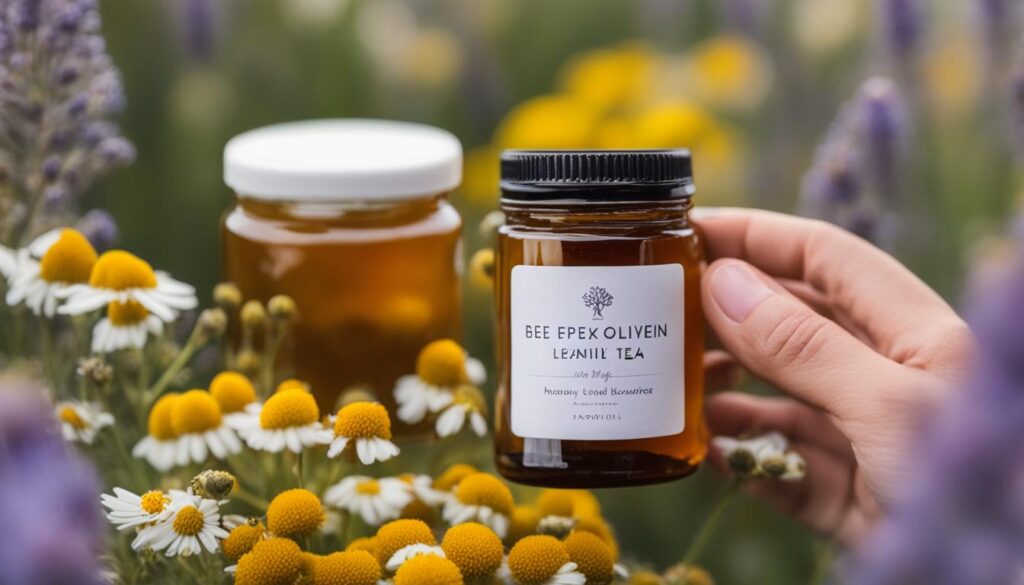
Bee Pollen as a Nutritious Food Source
Bee pollen is not only renowned for its potential health benefits but also for being a nutritious food source. Packed with vitamins, minerals, proteins, and carbohydrates, bee pollen offers a range of nutrients that contribute to overall well-being. Whether consumed in granules or capsules, bee pollen can be easily incorporated into various foods and drinks to enhance their nutritional content.
Table:
| Key Nutrients in Bee Pollen | Health Benefits |
|---|---|
| Vitamins (such as Vitamin C and B-complex) | – Boost immune system – Support energy production – Maintain healthy skin and hair |
| Minerals (such as potassium and calcium) | – Promote bone health – Support muscle function – Aid in nerve transmission |
| Proteins and Amino Acids | – Provide building blocks for tissues – Support muscle development and repair |
| Carbohydrates | – Serve as a source of energy – Maintain blood sugar levels |
It is important to note that while bee pollen is considered a nutritious food source, it is essential to exercise caution when incorporating it into your diet. Allergic reactions to bee pollen can occur, particularly in individuals with pollen allergies. Therefore, it is advisable to consult with a healthcare professional before consuming bee pollen or any other natural remedies.
Conclusion
In conclusion, while bee pollen is often hailed as a natural remedy for allergies, there is currently insufficient scientific evidence to support its effectiveness. Although some individuals may find relief from their local bee pollen allergies, it is important to exercise caution and consult with a healthcare professional before incorporating bee pollen or any other natural remedies into your allergy relief routine.
While bee pollen does offer potential health benefits, such as providing important nutrients and antioxidants, it is crucial to note that it may trigger allergic reactions in individuals with pollen allergies. Therefore, it is recommended to start with a small amount of bee pollen to test for any allergic reactions and discontinue use if any allergy symptoms occur.
While more research is needed to fully understand the mechanisms behind bee pollen’s potential allergy relief properties, it is essential to consider alternative options, such as medically approved treatments, for effective pollen allergies relief. Consulting with a healthcare professional can provide personalized advice and guidance based on your specific allergies and health conditions.
FAQ
Is there scientific evidence to support the effectiveness of bee pollen in eliminating allergies?
No, there is no scientific evidence to support the effectiveness of bee pollen in eliminating allergies. More research is needed to confirm its claims.
What are the potential health benefits of bee pollen?
Bee pollen is rich in nutrients, antioxidants, and has potential health benefits such as liver protection, anti-inflammatory properties, and wound healing.
How should I take bee pollen?
Bee pollen can be taken in granules, capsules, or mixed into other foods or drinks. It is important to start with a small amount to test for any allergic reactions.
Where can I find bee pollen?
Bee pollen is available at health food stores, herbal supplement shops, and local apiaries.
What are the risks of taking bee pollen?
Bee pollen can cause allergic reactions in some individuals, especially those who are allergic to bee stings. It is important to start with a small amount and discontinue use if any allergy symptoms occur.
What is the controversy surrounding bee pollen?
The use of bee pollen for allergy relief is a controversial topic, as there is still a lack of scientific evidence to support its effectiveness.
What is the nutritional composition of bee pollen?
Bee pollen contains vitamins, minerals, proteins, carbohydrates, and enzymes. The exact composition may vary depending on geographical location and the types of plants the bees collect from.
What are the potential therapeutic applications of bee pollen?
While there is limited scientific evidence, bee pollen has shown potential in reducing certain side effects of radiation therapy, providing benefits for men with chronic prostatitis or an enlarged prostate, and alleviating symptoms of premenstrual syndrome (PMS).
Is bee pollen a nutritious food source?
Yes, bee pollen is considered a nutritious food source due to its content of vitamins, minerals, proteins, and carbohydrates.
Can bee pollen cause allergic reactions?
Yes, bee pollen can cause allergic reactions, especially in individuals with pollen allergies or those who are allergic to bee stings.

